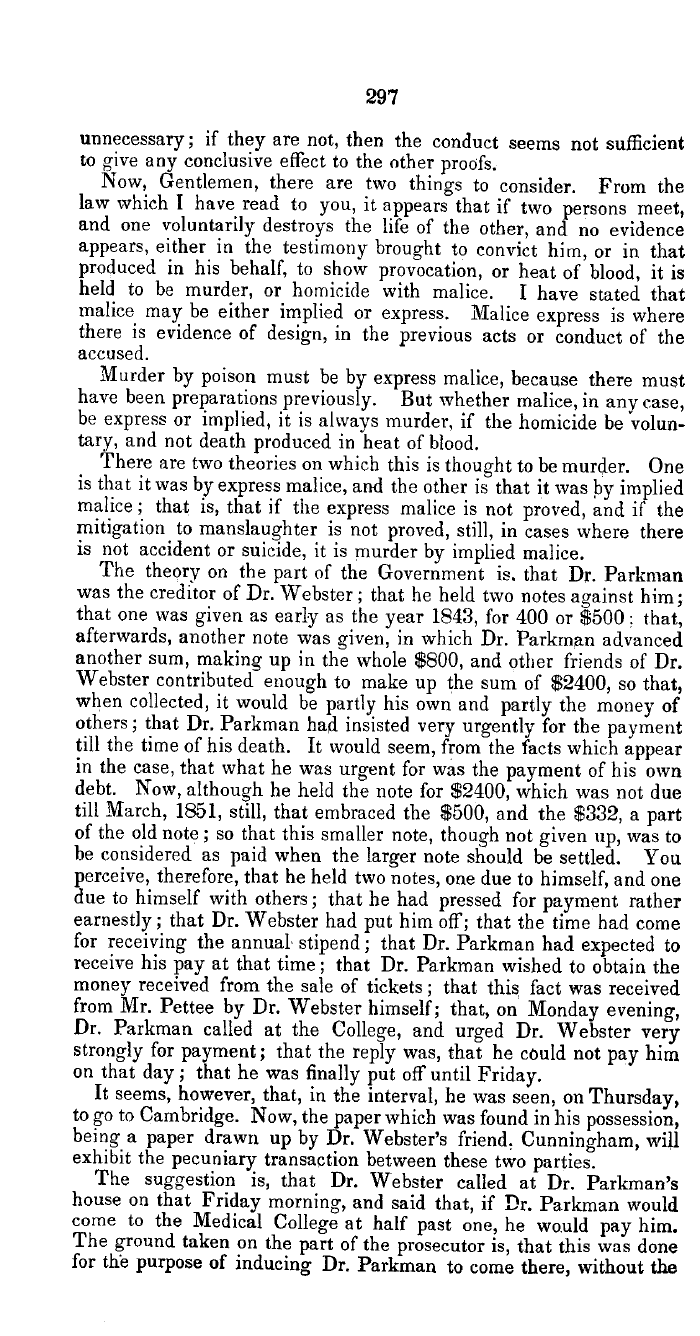|
297
unnecessary; if they are not, then the conduct seems not sufficient
to give any conclusive effect to the other proofs.
Now, Gentlemen, there are two things to consider. From the
law which I have read to you, it appears that if two persons meet,
and one voluntarily destroys the life of the other, and no evidence
appears either in the testimony brought to convict him, or in that
produced in his behalf, to show provocation, or heat of blood, it is
held to be murder, or homicide with malice. I have stated that
malice may be either implied or express. Malice express is where
there is evidence of design, in the previous acts or conduct of the
accused.
Murder by poison must be by express malice, because there must
have been preparations previously. But whether malice, in any case,
be express or implied, it is always murder, if the homicide be volun-
tary, and not death produced in heat of blood.
There are two theories on which this is thought to be murder. One
is that it was by express malice, acrd the other is that it was by implied
malice; that is, that if the express malice is not proved, and if the
mitigation to manslaughter is not proved, still, in cases where there
is not accident or suicide, it is murder by implied malice.
The theory on the part of the Government is. that Dar. Parkman
was the creditor of Dr. Webster; that he held two notes against him;
that one was given as early as the year 1843, for 400 or $500 : that,
afterwards, another note was given, in which Dr. Parkman advanced
another sum, making up in the whole $800, and other friends of Dr.
Webster contributed enough to make up the sum of $2400, so that,
when collected, it would be partly his own and partly the money of
others; that Dr. Parkman hall insisted very urgently for the payment
till the time of his death. It would seem, from the facts which appear
in the case, that what he was urgent for was the payment of his own
debt. Now, although he held the note for $2400, which was not due
till March, 1851, still, that embraced the $500, and the $332, a part
of the old note ; so that this smaller note, though not given up, was to
be considered as paid when the larger note should be settled. You
perceive, therefore, that he held two notes, one due to himself, and one
due to himself with others; that he had pressed for payment rather
earnestly; that Dr. Webster had put him off; that the time had come
for receiving the annual stipend; that Dr. Parkman had expected to
receive his pay at that time; that Dr. Parkman wished to obtain the
money received from the sale of tickets; that. this, fact was received
from Mr. Pettee by Dr. Webster himself; that, on Monday evening,
Dr. Parkman called at the College, and urged Dr. Webster very
strongly for payment; that the reply was, that he could not pay him
on that day; that he was finally put off until Friday.
It seems, however, that, in the interval, he was seen, on Thursday,
to go to Cambridge. Now, the paper which was found in his possession,
being a paper drawn up by Dr. Webster's friend. Cunningham, will
exhibit the pecuniary transaction between these two parties.
The suggestion is, that Dr. Webster called at Dr. Parkman's
house on that Friday morning, and said that, if Dr. Parkman would
come to the Medical College at half past one, he would pay him.
The ground taken on the part of the prosecutor is, that this was done
for the purpose of inducing Dr. Parkman to come there, without the
|

